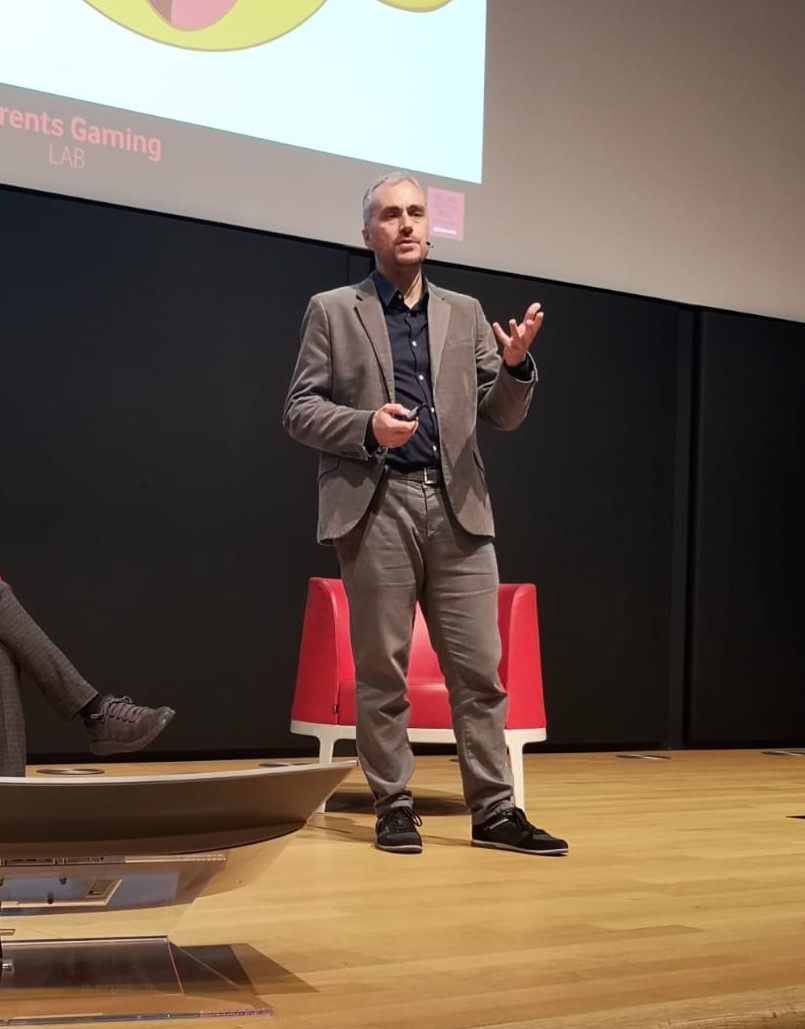Ivan Ferrero (Psychologist of New Technologies): videogames between anatomies and risks, the means of today’s kids to express themselves
The Milan weekend dedicated to the advent of digital ended on Sunday 17 March 2019; national appointment followed by our eSportsActivity.com team
The “Parents Gaming Lab – The fascination of video games” was very important and full of ideas, an in-depth event aimed at parents and teachers on the potential and risks associated with the videogame medium, organized by Vodafone Italia and Esl Italia in order to create a bridge between the various generations.
A success of analysis and debates addressed by the various experts present, including the Technical and Scientific Director Dr Ivan Ferrero, a psychologist with a particular propensity towards the impact of new technologies on the population and on how these are changing our way of life and to perceive reality.
Author and promoter of the web platform www.bullismoonline.it, for years he has fought the online phenomena of Cyberbullying, Internet Dependency, Online Gambling, issues that are involving increasingly younger sections of the population and on which disinformation often reigns most. absolute.
During the conference sessions at the Vodafone Theater, and interviewed by eSports Activity, Ferrero talks about himself, talking about his work and his work experiences as well as video games studies.
1 – Ivan, bullismoonline.it, an initiative launched for some time with the aim of informing. Can we take stock of this experience?
I started talking about Cyberbullying in 2012 dealing with the case of Amanda Todd, and in 2013 I opened a portal to inform even in Italy about the risks of digital life. In those days we were few and pioneers: in an Italy where digital technology was slow to develop, I felt that a digital conscience was missing.
The most widespread view among adults conceived digital as a tool, an appendix to our lives, so it was also difficult to understand how Web platforms could be sources of danger for our children.
And indeed in Italy the phenomenon was still small compared to other parts of the world where digital had developed earlier and faster. Then the smartphones have a foothold, especially the age of access to these tools began to fall every year that passed. And that’s when the phenomenon emerged in all its power.
The media have begun to talk about it, for better or for worse, in a more or less adequate way. In any case, the problem has leapt to the headlines, and since then adults have been unable to remain with their eyes closed.
In particular, the law promoted by Senator Elena Ferrara has given a further push towards prevention and intervention, thanks to funds specifically made available for projects on the subject, dedicated platforms, and specific rules and sanctions for these phenomena.
Finally, Cyberbullying acquires its own identity even before the institutions. From then on, thanks to projects in schools and on the territory, adults and children have become more aware and informed of the phenomenon.
In this context, my work has also changed: if in the early years I felt a very strong need to raise awareness of the phenomenon, in recent times I can afford to enter the classroom or in the rooms trusting in a background of information already shared with the participants.
This allows me to go straight to the point, or to deal with specific aspects of this phenomenon. Furthermore, with the awakening of consciences in this sense, Italians are also becoming more aware of an absolutely non-granitic and linear phenomenon, but characterized by deep ramifications that often change their dynamics. Consider, for example, the differences between Cyberbullying in the classical sense, and other phenomena such as the hate speech, trolling, or revenge porn. I also find it very positive that I am now in classes whose kids already know the phenomenon and the risks they can run online. This allows me more agility in structuring my interventions.
2 – The video game market, chats and new forms of interaction between players with so many parameters yet to be defined. How to protect those who decide to experiment with these new gaming experiences?
Digital, and therefore also online video games, are a real living space for our kids, just like school, or the other areas where our children go.
In a video game our kids put themselves: they put their skills at stake, they experiment, they compare themselves with other people.
In the case of video games equipped with chats and which offer the possibility of organizing teams or groups, the boys put into play and also experiment their social skills.
So first of all we have to understand that, although the digital has its own intrinsic laws to the particular contrast in which it operates, at the base we always find the same themes: the relationships between people, hatred and envy, friendship, feelings, emotions.
Consequently the real interventions, both prevention and treatment, must include this.
It is therefore necessary to help our children develop qualities such as empathy, the recognition of their own and others’ emotions, and help them develop affection, self-esteem and a sense of self-efficacy, or the perception of being able to do facing difficulties.
Items that they will then transfer more or less unconsciously to their moments of play. They also benefit from the precautions we already provide for their offline life.
The classic recommendation “not to accept candy from strangers” applies both offline and online.
3 – eSports, Interenet and Social, a world increasingly accessible to young people and children, a real taboo for generations of parents and adults. Are parental control software the right protection for our children?
Parental control software is a great tool to use with great care. Above all, they must not replace the value of the relationship between us and our boy.
To avoid raising useless and harmful relational barriers we must pay close attention to how we propose this tool to our son: not as something imposed by the authority, that is us, but as an extra tool for their protection and safety. We will also negotiate the use, that is to what extent I adult can “control”. Also defining in a clear and clear way the autonomies of the use of the vehicle is very important, so that both the boy and the adult know what is possible to do and what not.
Furthermore, we must also accept that our growing son begins to carve out his own spaces of autonomy in which we adults are not allowed, exactly as we did when we were their age.
It is a natural process and very important for the development of the autonomy of our children.
4 – Digital is an emotional and cognitive space for our children, before being a tool. What advice can you give to young people so that you don’t overdo it in the game?
In addition to the risks that can run online, and how to prevent them, it is also necessary to show the children different uses of the medium or of the channel.
Also show alternative activities that present the same gamification elements as their favorite Apps: in doing so do not offer them as a substitute, but as an opportunity for more entertainment and growth.
Therefore, rather than advice to the boys, I would speak of an example given by us adults, so that our children in turn learn.
5 – Recognizing and respecting the spaces of autonomy of their children does not mean abandoning them to fashions and trends without having a careful look at their growth paths. How to recognize and correct wrong attitudes or even the abuse of video games and technology?
The signs are varied, and must be interpreted taking into account the character and personality of our boy. Generally speaking we can talk about sudden mood changes, usually oriented towards the negative side. Even gradual abandonment behaviors of one’s hobbies, friends, or school.
We must also learn to recognize when our child is videogocating because the game is part of his growth, or when video games to escape from a reality he perceives as threatening and take refuge in a place that he perceives as safer and more tranquilizing. Because if our child starts to isolate himself in a video game, the responsibility is not the videogame, but is to be found in the boy’s life.
Regarding the intervention, the tricks I described in the previous answers apply.
6- Finally, what do you expect and what are the objectives of “Parents Gaming Lab – The fascination of video games”?
Events like this are very important, as they are an excellent bridge between boys and adults.
On the one hand they allow children to become more aware

. Copyright © eSports Activity

